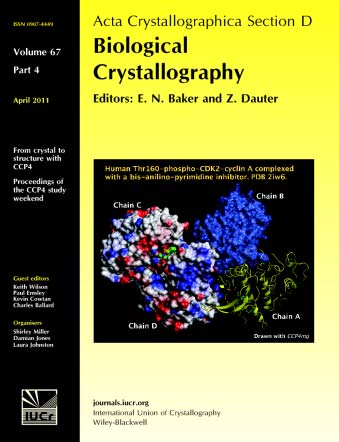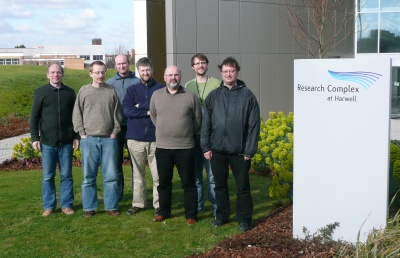Contact us
Research Complex at Harwell:
CCP4
Research Complex at Harwell (RCaH)
STFC Rutherford Appleton Laboratory
Harwell Science and Innovation Campus
Didcot
Oxon OX11 0FA
UK
Telephone: (+44) 1235 445790 (direct line)
Facsimile: (+44) 1235 567720
e-mail (preferred): ccp4@ccp4.ac.uk
|
Mission Statement
CCP4 exists to produce and support a world-leading, integrated suite of
programs that allows researchers to determine macromolecular structures
by X-ray crystallography, and other biophysical techniques. CCP4 aims to
develop and support the development of cutting edge approaches to
experimental determination and analysis of protein structure, and
integrate these approaches into the suite. CCP4 is a community based
resource that supports the widest possible researcher community,
embracing academic, not for profit, and for profit research. CCP4 aims
to play a key role in the education and training of scientists in
experimental structural biology. It encourages the wide dissemination of
new ideas, techniques and practice.
History and Constitution
The Collaborative Computational Project Number 4 in Protein
Crystallography was set up in 1979 to support collaboration between
researchers working on such software in the UK, and to assemble a
comprehensive collection of software to satisfy the computational
requirements of the relevant UK groups. CCP4 was originally supported
by the UK Science and Engineering Research Council (SERC), and is
now supported by the Biotechnology and Biological Sciences Research
Council (BBSRC). The project is coordinated at
STFC Rutherford Laboratory
by the
Scientific Computing Department of STFC.
The results of this effort gave rise to the CCP4 program suite, which
is distributed to academic and commercial users world-wide.
CCP4 is overseen by two committees:
- Working Group 1 meets annually at the Study Weekend and makes
general policy. PIs in all UK protein crystallography groups are invited
to WG1, as well as representatives of UK-based commercial groups.
- Working Group 2 presents a forum for active crystallographic
representatives of MX groups (UK based) to exchange information and to
co-ordinate their activities. WG2 organizes the two-day Study Weekend
(SW) and oversees the activities of CCP4 to organise and/or sponsor meetings.
- The Executive Committee comprises the Chairs of
Working Groups 1 and 2, the CCP4 Group Leader and elected individuals from
Working Group 1. The Executive Committee oversees the project on a day-to-day
basis and reports back to Working Group 1.
See the
Staff Page for current members of
the Executive Committee, and current developers.
Licensing
There are separate licences for academic and commercial groups, see
Licensing Page.
Referencing CCP4 and individual programs
 Any publication arising from use of the CCP4 software suite should include
both references to the specific programs used (see the
References section of the distributed
documentation) and the following reference to the CCP4 suite:
Any publication arising from use of the CCP4 software suite should include
both references to the specific programs used (see the
References section of the distributed
documentation) and the following reference to the CCP4 suite:
M. D. Winn et al.
Acta. Cryst. D67 , 235-242 (2011)
- "Overview of the CCP4 suite and current developments"
[ doi:10.1107/S0907444910045749 ]
reprint in PDF format
Copyright © International Union of Crystallography
Such citations are vital to the CCP4 project, and individual program authors,
in maintaining funding and thus being able to develop CCP4 further.
Many relevant articles can be found in the proceedings of the 2010
Study Weekend, published as a
special issue of Acta Cryst D.
Philosophy of the CCP4 suite
Unlike many other packages, particularly for small molecule
crystallography, the CCP4 suite is a set of separate programs which
communicate via standard data files, rather than all operations being
integrated into one huge program. This has some disadvantages in that
it is less easy for programs to make decisions about what operation to
do next - though it is seldom a problem in practice - and that the
programs are less consistent with each other (although much work has
been done to improve this). However the great advantage arising from
such loose organisation is that it is very easy to add new programs or to modify
existing ones without upsetting other parts of the suite. Converting a program
to use the standard CCP4 file formats is generally straightforward, and the
philosophy of the collection has been to be inclusive, so that several
programs may be available to do the same task. The components of the
whole system are thus a collection of programs using a standard
software library to access standard format files (and a set of
examples files and documentation) available for most
operating systems (including Linux, Windows and Mac OS X).
Programs are mostly written in C, C++, Fortran and Python.
To use the programs the user must assign input and output files,
and run the programs. Often an output file
becomes the input to the next step, and system parameter substitution
may be used to create filenames in a systematic way. Most
crystallographic calculations involve a series of steps in which no
decisions need be made until the end, and a command file provides an
easy way of chaining calculations.
Standard file formats are defined for the principal data types used
in crystallography: reflection data; density maps; and atom
coordinates. In defining these formats, a number of trade-offs are
made between efficiency (in space and access time), flexibility,
portability, and simplicity of use.
There is a policy of continual technical and scientific updates to the
suite. Where existing programs have been incorporated into the suite
they have often subsequently undergone considerable modification above
that needed to use the CCP4 file formats.
CCP4 Resources
- Helpdesk
- Bug reports and/or problems running the programs should be sent to
ccp4@ccp4.ac.uk. We will endeavour to
help where we can (but note that no warranty for the software is given
or implied). But remember that we are not psychic and cannot solve problems
without the necessary information (so send input script, entire log file
and relevant data files).
- Documentation
- Individual program documentation
is available, together with a PostScript version of the CCP4
manual with content distinct from the program documentation (about
1.5 MB). The corresponding files are distributed with the suite.
- Problems pages
- If you are having problems with CCP4 programs either compiling or running
then have a look at the Problem
Page. This contains various fixes effected since the latest release.
- Tutorials, examples and test data sets
- A set of tutorials is distributed with the program suite, see the
examples/tutorial subdirectory. There are also a large
number of individual examples, see the examples/unix/runnable
subdirectory. The tutorials and examples use distributed test data.
- Email distribution lists
- The most popular is the Bulletin
Board for general questions on protein crystallography (not
necessarily CCP4-related). We also run a
developers' list, and several other project-based lists.
- Meetings
- CCP4 organises and/or sponsors several meetings a year, see the
Courses page. The most important of
these is the two-day Study Weekend held each year on a
chosen subject, just after the New Year. Back copies of the
proceedings to these meetings are
available.
- Newsletter
- CCP4 publishes an occasional newsletter
and some older issues are available by
anonymous
ftp. From June 1996, newsletters are available in
html format.
Supported by:






 Any publication arising from use of the CCP4 software suite should include
both references to the specific programs used (see the
References section of the distributed
documentation) and the following reference to the CCP4 suite:
Any publication arising from use of the CCP4 software suite should include
both references to the specific programs used (see the
References section of the distributed
documentation) and the following reference to the CCP4 suite: